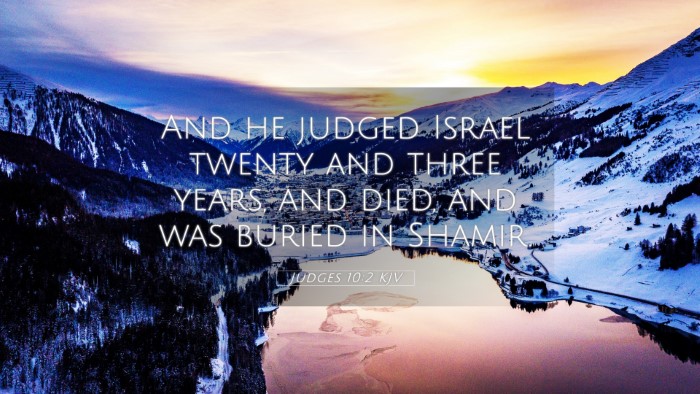Old Testament
Genesis Exodus Leviticus Numbers Deuteronomy Joshua Judges Ruth 1 Samuel 2 Samuel 1 Kings 2 Kings 1 Chronicles 2 Chronicles Ezra Nehemiah Esther Job Psalms Proverbs Ecclesiastes Song of Solomon Isaiah Jeremiah Lamentations Ezekiel Daniel Hosea Joel Amos Obadiah Jonah Micah Nahum Habakkuk Zephaniah Haggai Zechariah MalachiJudges 10:2 Similar Verses
Judges 10:2 Cross References
And he judged Israel twenty and three years, and died, and was buried in Shamir.
Uncover the Rich Themes and Topics of This Bible Verse
Listed below are the Bible themes associated with Judges 10:2. We invite you to explore each theme to gain deeper insights into the Scriptures.
Judges 10:2 Cross Reference Verses
No cross reference images were found in our system for this Bible passage.
Judges 10:2 Verse Analysis and Similar Verses
Understanding Judges 10:2
Verse: Judges 10:2 - "And he judged Israel twenty and three years, and died, and was buried in Shamir." This verse highlights the leadership and legacy of a judge in Israel, underscoring the themes of governance, justice, and mortality.
Significance of Judges 10:2
In this verse, the focus is on the individual who served as a judge over Israel for twenty-three years. This highlights not only his role in governance but also the cycle of leadership among the Israelites. The mention of his burial signifies the end of his earthly influence and the inevitable cycle of life and death.
Commentary Insights
Utilizing public domain commentaries, we can explore deeper meanings:
- Matthew Henry's Commentary: Matthew Henry details the importance of judges in Israel's history, emphasizing that their role was critical in guiding the people according to God's laws. The longevity of this judge's service suggests a period of stability in the nation.
- Albert Barnes' Commentary: Barnes indicates that the judge's tenure reflects God's provision for His people during tumultuous times. His death and burial in Shamir signify the transition of leadership and the need for continuous faithfulness to God’s covenant.
- Adam Clarke's Commentary: Clarke notes that the naming of the burial site highlights the tribal affiliations and the significance of place in Israelite society. Shamir could also denote a geographical and spiritual heritage relevant to the narrative.
Bible Cross-References
This verse relates to several other scriptures, offering a broader context and understanding:
- Judges 2:16 - "Nevertheless, the LORD raised up judges, which delivered them out of the hand of those that spoiled them." This verse shows God’s continual intervention through judges to save Israel.
- 1 Samuel 12:11 - "And the LORD sent Jerubbaal, and Bedan, and Jephthah, and Samuel, and delivered you out of the hand of your enemies on every side..." Here we see a list of judges, indicating a lineage of leadership.
- Hebrews 11:32-33 - "And what shall I more say? For the time would fail me to tell of Gideon, and of Barak, and of Samson, and of Jephthah..." This New Testament reference points to the significance of judges in the faith legacy of Israel.
- Judges 8:33 - "And it came to pass, as soon as Gideon was dead, that the children of Israel turned again, and went a whoring after Baalim..." Illustrating the consequences following the leadership of a judge.
- Acts 13:20 - "And after that he gave unto them judges about the space of four hundred and fifty years, until Samuel the prophet." This highlights the duration of judgeship as pivotal in the history of Israel.
- Micah 6:16 - "For the statutes of Omri are kept, and all the works of the house of Ahab, and ye walk in their counsels..." This verse hints at disobedience in contrast to the judges’ role in guiding toward righteousness.
- Jeremiah 7:25 - "Since the day that your fathers came forth out of the land of Egypt unto this day I have even sent unto you all my servants the prophets..." This emphasizes the burden of leadership and prophecy throughout Israel's history.
Thematic Connections and Analysis
Judges 10:2 serves as a pivotal reference point for understanding the cyclical nature of leadership in Israel:
- Governance: The role of judges indicates a theocracy; the judge was not just a leader but also a spiritual guide.
- Legacy: The lasting impact of a leader extends beyond their tenure, influencing the people’s allegiance to God.
- Transition: Leadership transitions often led the Israelites either closer to or further from God, as seen in the book of Judges.
Tools for Bible Cross-Referencing
To fully grasp the significance of cross-references and thematic connections among Bible verses, several effective tools can be utilized:
- Bible Concordance: A useful resource for locating specific words and their occurrences throughout scripture.
- Bible Cross-Reference Guide: Guides that assist in identifying links between similar themes or narratives across scriptures.
- Cross-Reference Bible Study: Effective methods to facilitate studying connections between different passages.
- Bible Reference Resources: Bibliographies or databases that compile cross-references and related themes for in-depth exploration.
- Comprehensive Bible Cross-Reference Materials: Detailed studies that illustrate the relationships between verses, helping in sermon preparation and personal study.
Conclusion
Judges 10:2 reveals the significant theme of leadership within the Israelite community and the cyclical pattern evident in their history. Through cross-referencing various scriptures, a deeper understanding of God's workings in guiding His people can be appreciated. By utilizing tools for Bible cross-referencing, believers can uncover rich connections, enhancing both personal faith and communal understanding.


